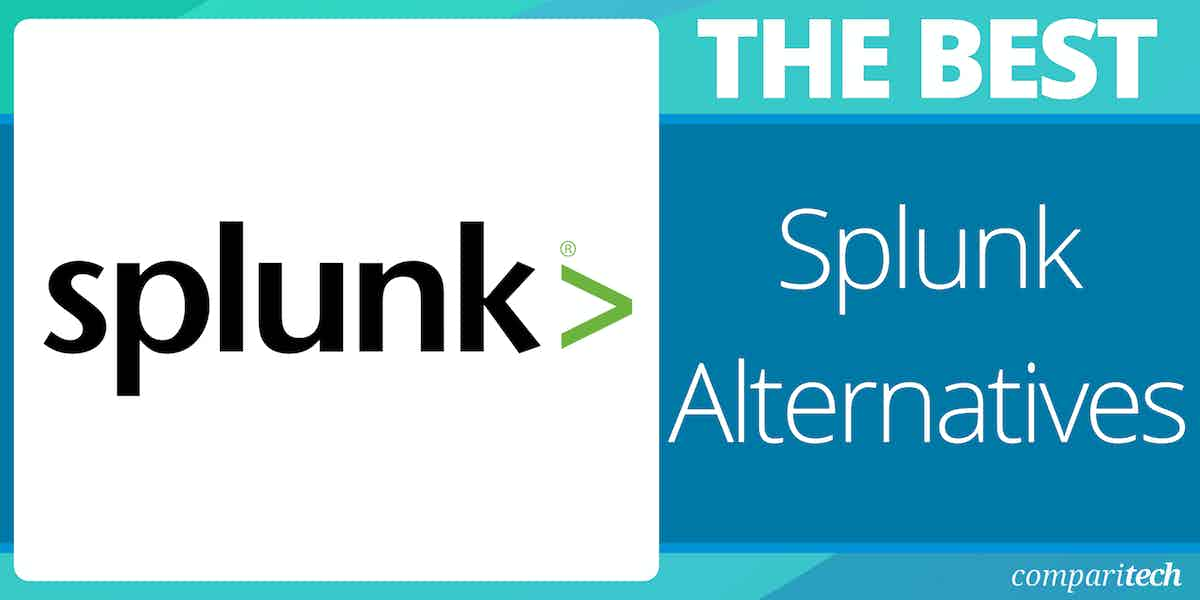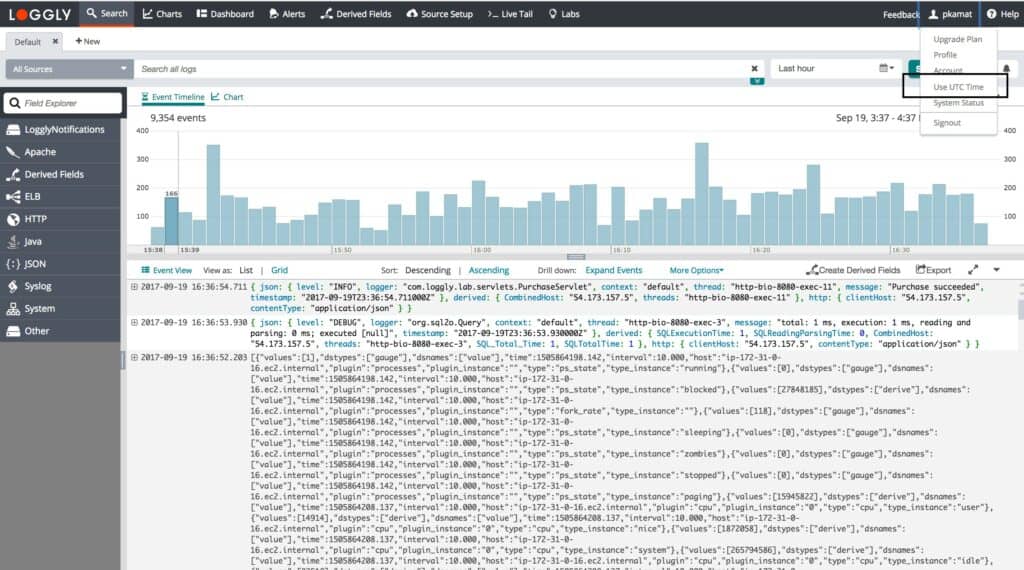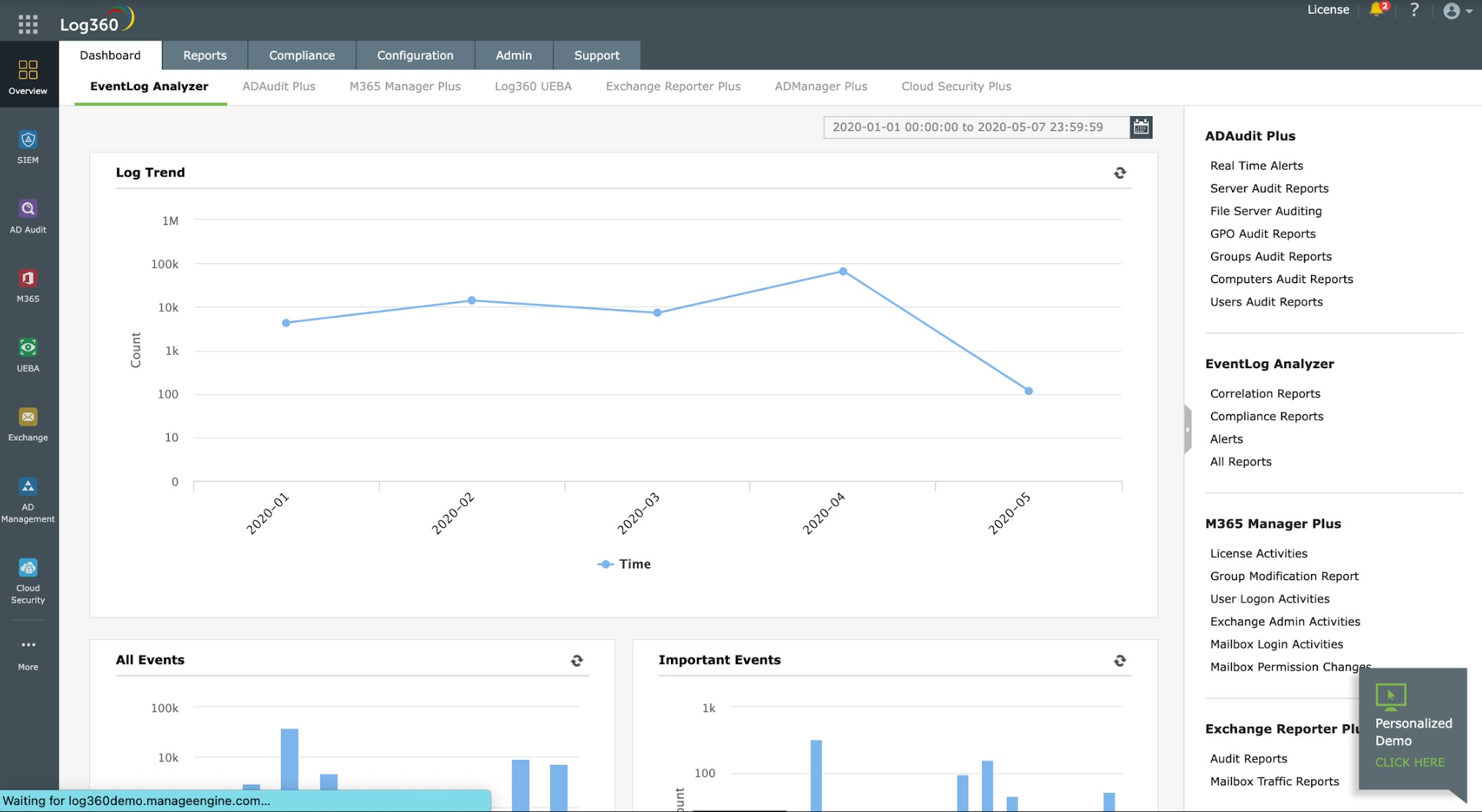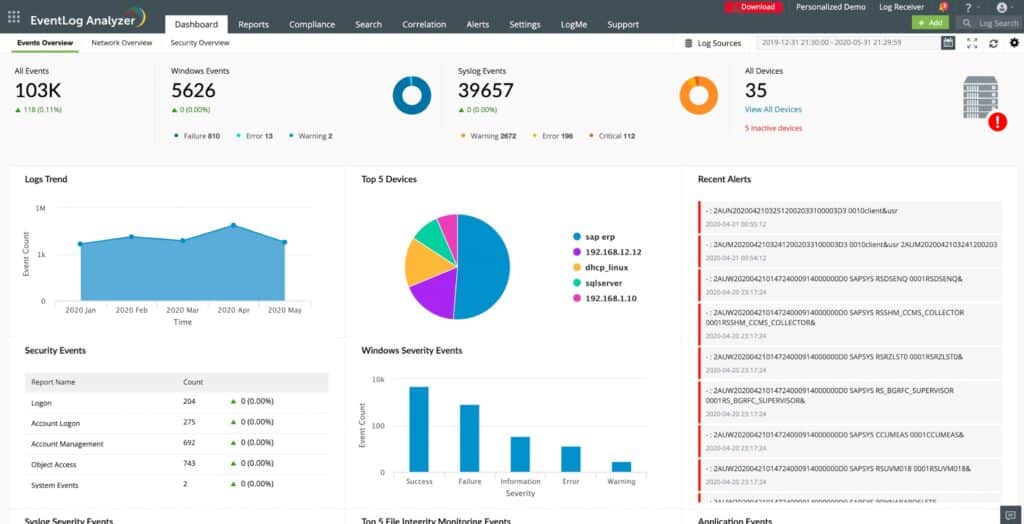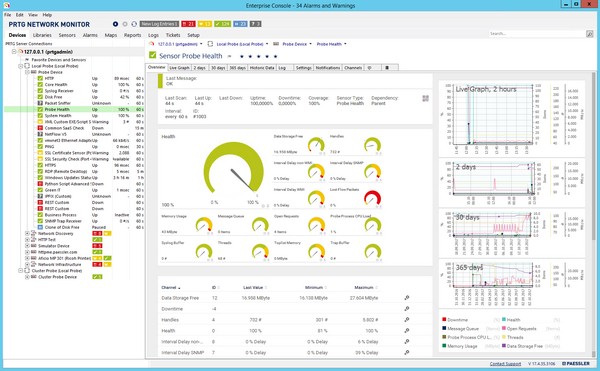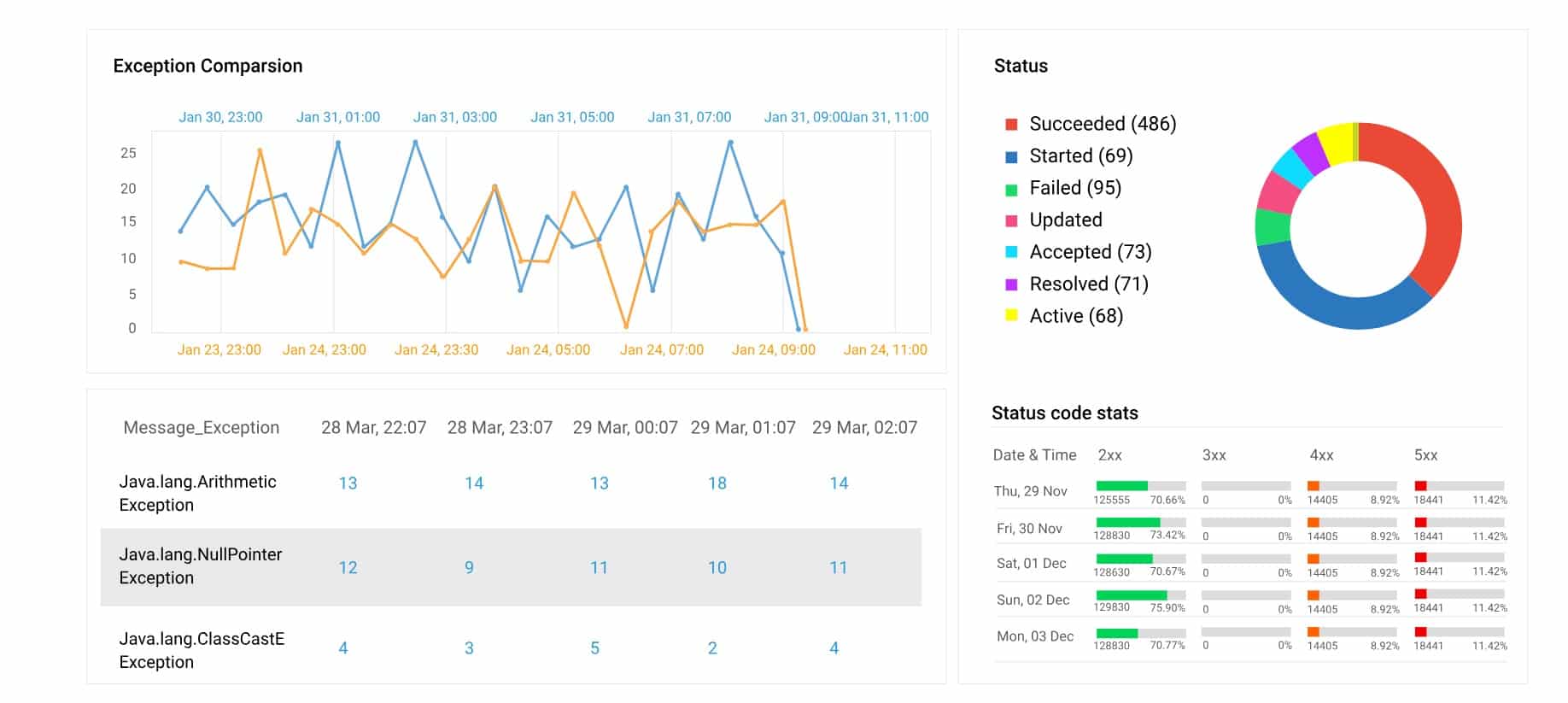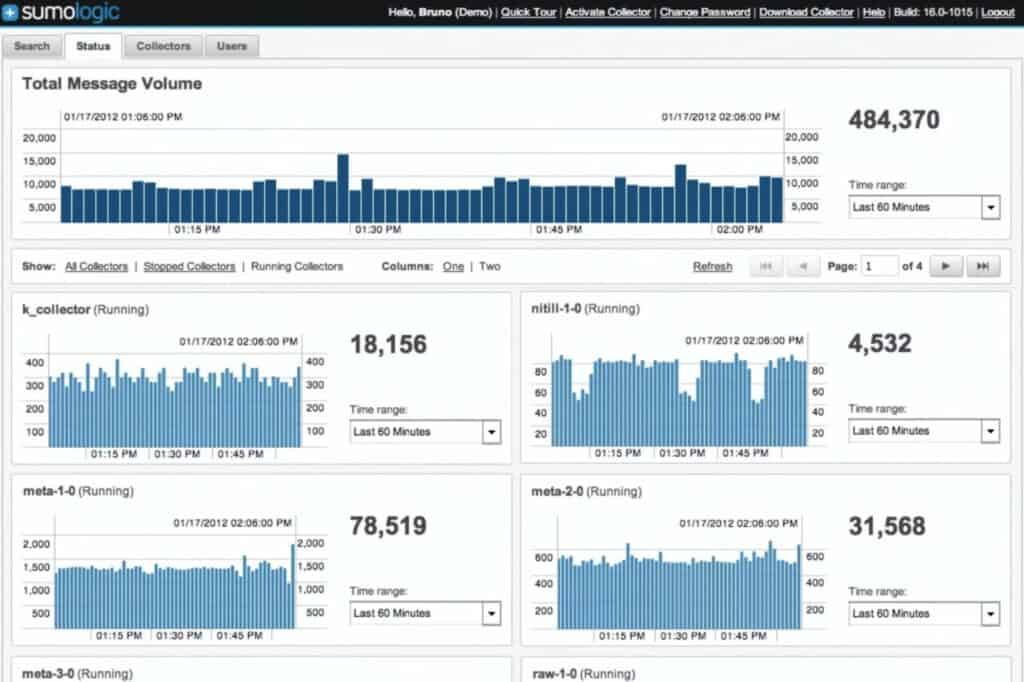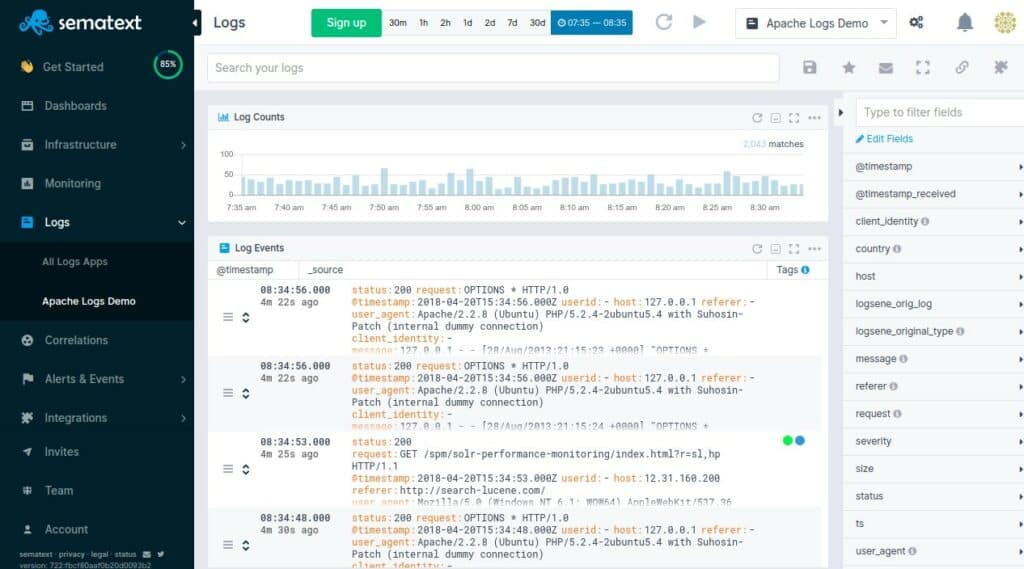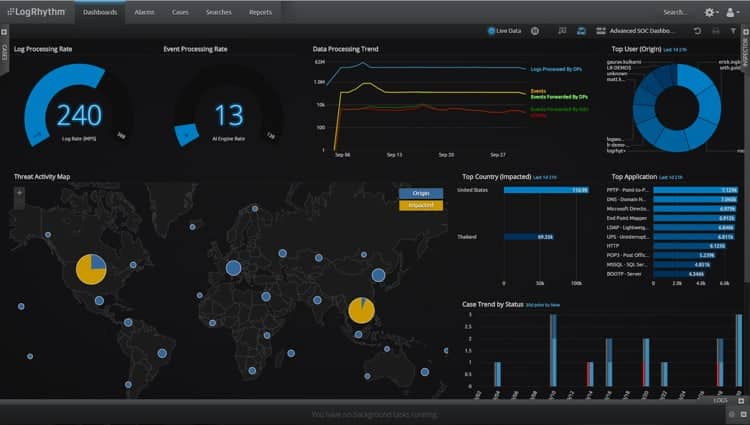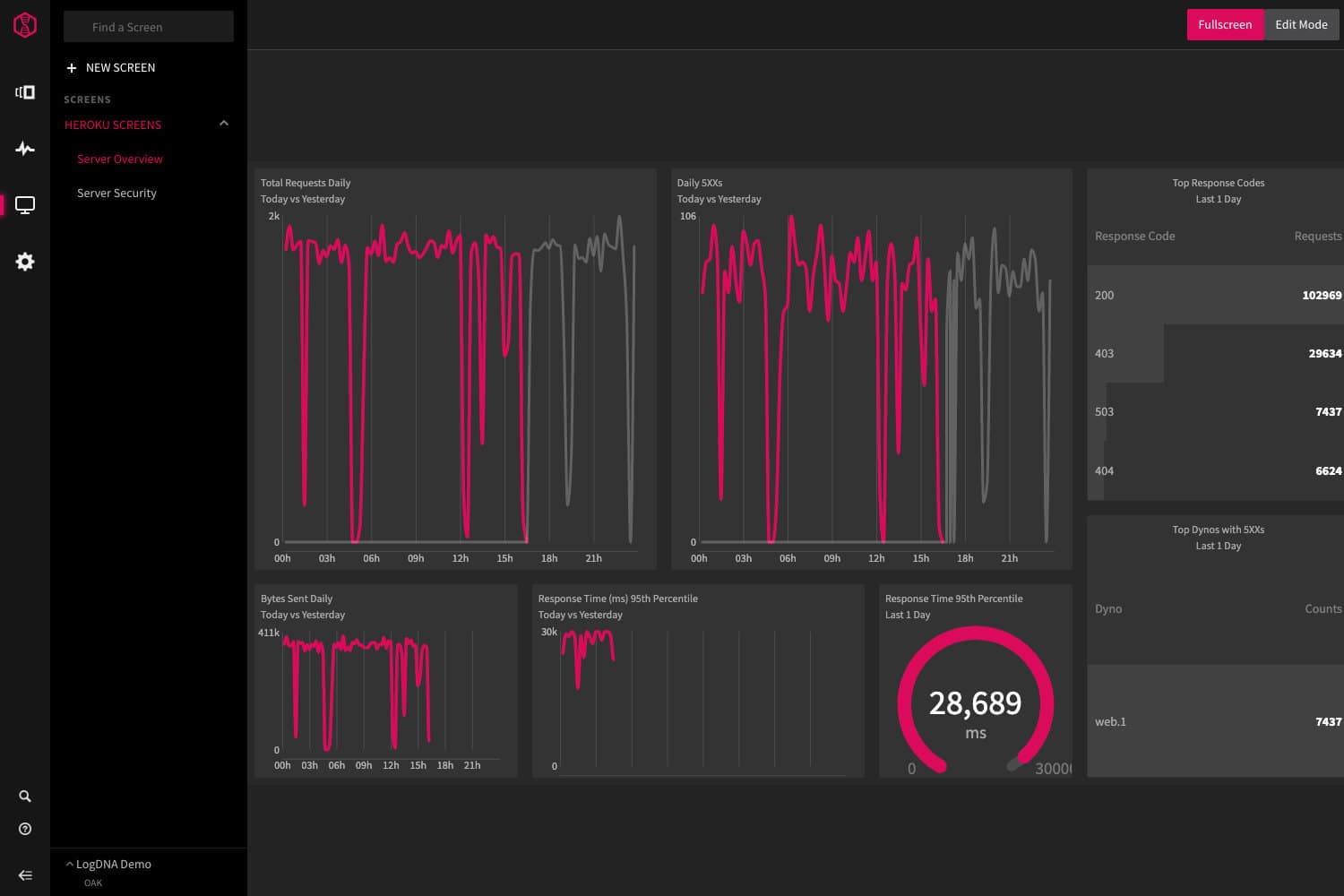Splunk is one of the most widely-used log management solutions on the market, but it’s not right for everyone. For companies that need to monitor a large volume of data, there are many other Splunk alternatives that are a better fit. In this article, we’re going to look at the top Splunk alternatives on the market.
The list includes tools for Windows, macOS, and Linux. We’ve focused on tools that can collect and centralize log data from a wide variety of sources with high-quality real-time monitoring capabilities like graphs and alerts.
Here is our list of the eleven Best Splunk alternatives:
- Loggly (FREE TRIAL) Free SaaS-based log monitoring software with custom dashboards, graphs and charts, alerts, reports, and more.
- ManageEngine Log360 (FREE TRIAL) An on-premises SIEM package that includes a threat intelligence feed to speed up threat detection, based on logs collected by the package’s agents. Runs on Windows Server.
- ManageEngine EventLog Analyzer (FREE TRIAL) SIEM software that can collect logs from 700+ sources with real-time event correlation, alerts, compliance reports, and more.
- Paessler PRTG Network Monitor (FREE TRIAL) Network and log monitoring software with out-of-the-box sensors, a Windows Event log Sensor, Syslog Receiver Sensor, alerts, notifications, and more.
- Site24x7 Log Management (FREE TRIAL) This cloud-based package gathers logs through an on-site agent, consolidates them, and stores them. It also has a data viewer for analysis. Start a 30-day free trial.
- Datadog Log Management Cloud monitoring and log management software with centralized log collection, filtering, log-processing pipelines, alerts, and more.
- SolarWinds Security Event Manager One of the top Splunk alternatives. SIEM software with log collection, automated threat detection, alarms, compliance reports, and more.
- Sumo Logic SaaS-based log management software with dashboards, integrations, predictive analytics, threat intelligence, alerts, and more.
- Sematext Logs Log management software with real-time log monitoring, custom dashboards, reports, alerts, and more.
- LogRhythm NextGen SIEM Platform Log analysis software with custom dashboards, visualizations, an AI engine, security analytics, an integrated SOAR, and more.
- Mezmo Log Analysis This cloud platform provides a log manager and analyzer with a free iter and also offers distributed tracing services.
The Best Splunk Alternatives
Our methodology for selecting an alternative to Splunk
We reviewed the market for log managers and analyzed tools based on the following criteria:
- The ability to consolidate log messages of different formats into a common layout
- A log manager that can rotate log files
- A management system that creates a meaningful directory structure for logfile storage
- A facility to analyze log messages through sorting and filtering
- An option to archive and recall logfiles
- A free trial or a demo account for a risk-free assessment period
- Value for money, provided by a comprehensive tool that is offered at a reasonable price
With these selection criteria in mind, we have investigated a selection of log management tools that are suitable for businesses of all sizes.
1. Loggly (FREE TRIAL)
Loggly is a free SaaS-based log monitoring tool that is capable of processing large volumes of log data taken from any source. With Loggly you can view log events in real-time from multiple sources ranging from cloud platforms to databases, mobile apps, operating systems, and more. Through the dashboard, you can see an overview of performance for systems throughout your environment, with metrics that go down to the request level.
Key Features:
- Comprehensive Log Management: Aggregates logs from diverse sources for centralized monitoring.
- Intuitive Dashboard: Visualizes data with customizable graphs and charts for performance overview.
- Real-Time Alerts: Configures notifications for critical events via various communication channels.
- Custom Reports: Enables dashboard conversion into detailed reports with export functionality.
Why do we recommend it?
Loggly is a log management system rather than a log analysis tool, so it doesn’t compete directly with Splunk The top plan of the system, however, does have an anomaly detection system that searches through log files. This is a lot closer to the functionality of Splunk.
A customizable dashboard offers graphs and charts you can use to visualize performance. The time shift feature allows you to change the time period a particular chart shows helping you to spot performance concerns more easily. If you don’t want to build your own dashboard then you can use one of the prebuilt templates instead.
Create alerts to notify you about security events in your environments. The software sends alerts by Slack, PagerDuty, Microsoft Teams, and other Webhook-compatible services so that you always receive the latest information. If you wish to create a report then you can convert the dashboard into one and export it in PNG format.
Who is it recommended for?
This system is a good tool for businesses that need to manage, file, and archive log messages. This task is necessary for compliance with data protection standards such as PCI DSS. The SaaS package is available in a free version, called Lite, which has a low data throughput allowance.
Pros:
- Cloud-Based Flexibility: Adapts to any scale without the need for onsite infrastructure adjustments.
- User-Friendly Setup: Simplifies the onboarding process for immediate log management capabilities.
- Wide Source Integration: Seamlessly collects logs from a variety of platforms including AWS and Docker.
- Instant Data Analysis: Provides immediate access to log data for timely review and decision-making.
- Accessible Free Version: Offers a basic free plan suitable for small-scale or initial log management needs.
Cons:
- Limited Trial Duration: A longer trial period is desired for more thorough evaluation.
Loggly is a great solution for enterprises that require an agentless tool that can handle data from almost any log source. The free version supports a single user. If you require more users, paid versions start at $48 (£37.48) per month for the Standard version, which supports up to three users. You can start the 14-day free trial here.
2. ManageEngine Log360 (FREE TRIAL)
The ManageEngine Log360 package includes a log management system, a SIEM, a file integrity monitoring service, and a compliance reporting unit. This system includes agents that install on endpoints. These programs collect log messages from the operating system and by interacting with applications running on the device. There are also agents for cloud platforms, including AWS, Azure, and Salesforce.
Key Features:
- Hybrid Log Collection: Gathers log data both on-site and from cloud platforms like AWS, Azure, and Salesforce.
- Log Viewer: Enables efficient review and analysis of log messages through a centralized interface.
- Threat Intelligence: Incorporates feeds for up-to-date threat data, enhancing security posture.
- Automated Detection: Identifies potential threats automatically, improving response times.
- Service Desk Integration: Directs alerts to service desks such as ManageEngine ServiceDesk Plus, Jira, and Kayoko for prompt action.
Why do we recommend it?
ManageEngine Log360 is a bundle of tools that are also available individually. The most relevant component of this package, when looking for an alternative to Splunk, is the EventLog Manager. You can read more details about this unit below. Other units provide further protection measures for on-premises and cloud assets.
An exceptional feature in this package is a threat intelligence feed, which is a service that is usually encountered in a SIEM. The system raises an alert if it detects a suspicious event. Alerts can be fed into service desk systems, including ManageEngine ServiceDesk Plus, Jira, and Kayoko.
ManageEngine Log360 provides a source for compliance auditing and it provides compliance reporting for PCI DSS, GDPR, FISMA, HIPAA, SOX, and GLBA.
Who is it recommended for?
Potential buyers of Log360 should also examine all of the component modules of the package because they might get a better deal by just getting those units that they need. There is no free edition of Log360 but you do get to use each of the components with a free version.
Pros:
- Compliance Mastery: Offers robust compliance reporting capabilities for standards like PCI DSS, GDPR, and HIPAA.
- Integrity Monitoring: Provides file integrity monitoring to ensure the safety and security of critical files.
- Activity Insights: Tracks account activities to detect and respond to suspicious behaviors promptly.
- Proactive Alerts: Notifies teams of unusual activities, fostering a proactive security approach.
- Comprehensive Log Management: Delivers extensive log management features for thorough data analysis and security.
Cons:
- Platform Limitation: Lacks support for Linux environments, restricting its usability in Linux-based infrastructures.
ManageEngine Log360 installs on Windows Server. It is able to collect logs from other operating systems and cloud platforms across the network. Log360 is available for a 30-day free trial.
3. ManageEngine EventLog Analyzer (FREE TRIAL)
ManageEngine EventLog Analyzer is a SIEM tool and Splunk alternative that you can use to monitor system logs. With ManageEngine EventLog Analyzer you can collect logs from over 700 sources with a mixture of agentless log collection, agent-based log collection, and log imports. Navigate through collected logs with customizable filters to identify the most significant security events.
Key Features:
- Versatile Log Collection: Supports over 700 sources with a blend of agentless, agent-based, and import methods.
- Customizable Filters: Facilitates targeted log analysis with adjustable filtering options.
- Real-Time Correlation: Offers immediate event correlation to pinpoint and alert on attack patterns.
- Compliance Readiness: Generates reports for key regulations like PCI DSS and GDPR, ensuring audit preparedness.
- Diverse Alerts: Enables multi-channel alerts through SMS, email, or app integrations for immediate notifications.
Why do we recommend it?
ManageEngine EventLog Analyzer is a log server and consolidator that will file log messages and manage those files in meaningful directories. The package includes a data viewer that has analytical tools and the main function of the EventLog Analyzer is its SIEM system for threat hunting.
Real-time event correlation analyses log data to identify attack patterns. The software comes with 30 preconfigured SIEM correlation rules to determine when an alert is raised. Correlation rules can also be customized enabling you to define other attack patterns and set trigger conditions that the platform will respond to.
Compliance reporting templates allow you to prepare for auditing for frameworks such as PCI DSS, HIPAA, FISMA, GDPR, SOX, and ISO 27001. Schedule reports to run automatically and then export compliance reports in HTML, PDF, and CSV to share with the rest of your team.
Who is it recommended for?
The software for EventLog Analyzer installs on Windows Server or Linux. It is also offered as a SaaS platform. You need to organize log storage yourself, even if you get the SaaS version. There is a Free edition, which is limited to collecting logs from five sources, and there is also a version for MSPs.
Pros:
- Adaptable Dashboards: Features customizable dashboards ideal for monitoring in network operations centers.
- Comprehensive Notifications: Ensures critical alerts are promptly received across various channels.
- Anomaly Detection: Aids technicians with anomaly detection tools for enhanced operational efficiency.
- File Integrity Monitoring: Acts as an early detection system for cybersecurity threats such as ransomware.
Cons:
- No Mobile Support: The absence of a dedicated mobile application limits remote monitoring capabilities.
- Learning Curve: Navigating and fully utilizing the product’s extensive features may require significant time.
ManageEngine EventLog Analyzer is a great tool for enterprises that require a basic event log management tool. There is a free version that supports up to five log sources. Paid versions start at $595 (£464.64) for the Premium Edition. It is available on Windows and Linux. You can download a 30-day free trial.
4. Paessler PRTG Network Monitor (FREE TRIAL)
Paessler PRTG Network Monitor is a free network monitoring tool that also provides log monitoring. With Paessler PRTG Network Monitor you can use out-of-the-box sensors to collect log data. Sensors display performance data as numerical values and dials so you can monitor live data and historical performance data efficiently.
Key Features:
- Log Monitoring: Integrates specialized sensors for monitoring various log files efficiently.
- Ready-to-Use Sensors: Comes with preconfigured sensors for immediate deployment and data collection.
- Event Log Tracking: Monitors Windows log files for system and application events with detailed sensors.
- Syslog Management: Captures and quantifies syslog messages, including warnings and errors.
- Versatile Alerts: Enables configurable notifications through multiple channels like email, SMS, and Slack.
- Automated Actions: Supports automated responses for predefined conditions, enhancing system reactivity.
Why do we recommend it?
Paessler PRTG Network Monitor provides two sensors that relate to logs. The system doesn’t collect or process Windows Event Logs. Instead, it clouds the frequency of their generation on a particular device. PRTG does collect Syslog messages but it doesn’t provide a method to analyze them.
One sensor that’s useful for log management is the Windows Event Log Sensor, which you can use to monitor Windows log files, including system and application logs. Another valuable sensor is the Syslog Receiver Sensor, which allows you to monitor the number of received syslog messages per second, number of warning messages per second, number of error messages per second, and more.
With threshold-based alerts, you can configure Paessler PRTG Network Monitor to send you notifications whenever a key parameter is exceeded. The system can send notifications as email, SMS messages, push notifications, Slack messages, SNMP traps, or automatically respond by executing HTTP actions or programs.
Who is it recommended for?
The PRTG tool is great for monitoring networks, servers, and applications. it is a collection of a lot of monitors and the log sensors are just two of them. The system is free if you only activate 100 sensors. Access PRTG on its SaaS platform or download the software onto Windows Server.
Pros:
- Adaptable Platform: Easily scales monitoring efforts, accommodating businesses of all sizes.
- Usage-Based Pricing: Offers a flexible pricing model based on the number of sensors activated.
- Comprehensive Notifications: Ensures critical alerts are efficiently communicated across various platforms.
- Unified Monitoring: Allows for extensive internal monitoring of networks, applications, and user activities.
Cons:
- Complexity: Features a densely packed interface that may necessitate a learning period to navigate effectively.
Paessler PRTG Network Monitor is an excellent choice for SMEs that need a low-cost log management solution. The Freeware version supports up to 100 sensors. If you require more sensors you can upgrade to a paid version. Paid versions start at $1,750 (£1,367) for 500 sensors. It is available on Windows and Mac. You can start the 30-day free trial.
5. Site24x7 Log Management (FREE TRIAL)
Site24x7 Log Management is a service on the Site24x7 cloud platform. The platform installs a collection agent on the monitored network and that unit collects circulating log messages. The system will gather logs from operating systems and software packages and the service includes storage space for log files.
Key Features:
- Diverse Log Collection: Supports both Syslog and Windows Events, ensuring comprehensive log gathering.
- Efficient Log Uploads: Facilitates the easy uploading of logs for centralized management.
- Advanced Log Parsing: Converts logs into a standardized format for uniform analysis.
- Flexible Log Forwarding: Enables the redirection of logs to other systems or applications as needed.
- In-Depth Log Analysis: Offers tools for detailed examination and interpretation of log data.
Why do we recommend it?
The Site24x7 Log Management system is part of a platform of system monitoring and management tools. So, you don’t just get a log manager within this package, you get all of the tools needed to run an IT system. The log manager can be used to construct performance monitoring or security monitoring systems.
The log server receives all log messages, converts them into a standard format, and tags them according to source. The dashboard shows statistics about the arriving log messages, mainly about volumes per source and overall. These statistics about messages can have alerts placed on them. So, for example, if log rates suddenly drop or surge, the network manager would probably need to know.
The system can be set up to forward alerts to technicians as notifications. These can be sent by SMS, push notification, voice call, email, or Slack message. It is also possible to set up your own alerts within the log message data viewer. That utility includes basic analytical tools and you can store your searches to run repeatedly and then name processes to launch if a specific condition is detected. Thus, you can create your own early warning system for performance problems or security issues.
Who is it recommended for?
This log manager is primarily designed to consolidate and store log messages. It provides log volume statistics and has a data viewer that can implement data analysis. However, its data analytics capabilities are not as powerful as those available in Splunk. The tool can be used to filter messages and pass them through to third-party tools for action.
Pros:
- Versatile Data Viewer: Comes equipped with robust sort, filter, and grouping capabilities for log analysis.
- Trigger-Based Searches: Allows the creation of search-based triggers for automated response actions.
- Automated Process Capabilities: Provides options for process automation based on log analysis outcomes.
- Comprehensive Observability: Part of a full-stack monitoring solution, enhancing overall IT system management.
- MSP Friendly: Offers functionalities tailored to the needs of managed service providers.
Cons:
- Lacks Local Deployment: Does not offer an on-premises deployment option, limiting choices for certain use cases.
Site24x7 is organized into subscription plans and all of them include the Log Management unit. You can assess the package by accessing a 30-day free trial.
6. Datadog Log Management
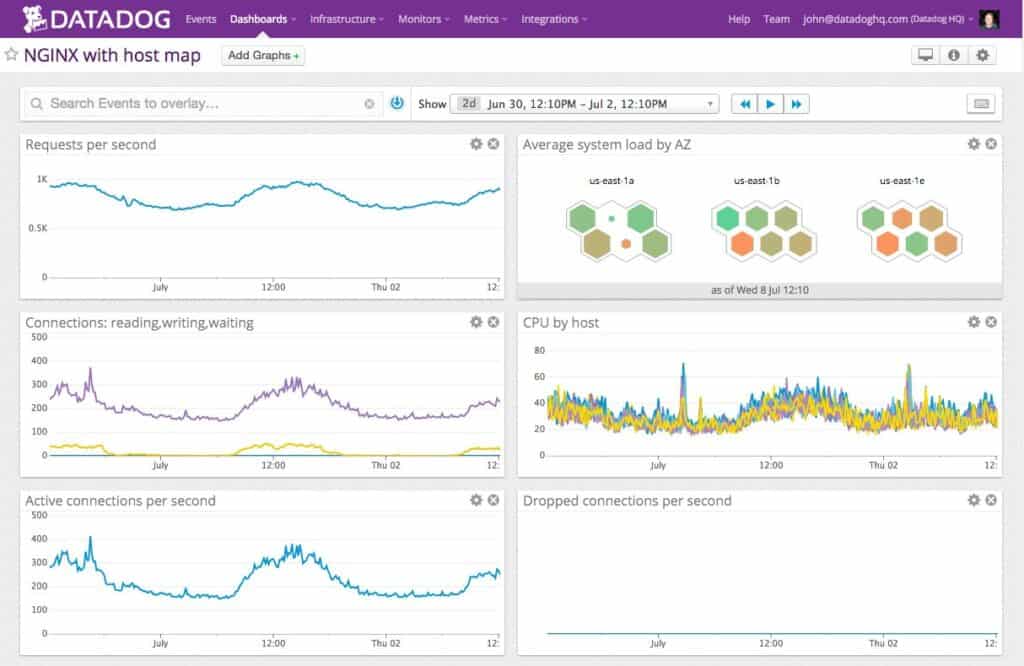
Datadog is a cloud monitoring and log management solution that allows you to centrally collect log data from any source. With Datadog you can collect, search, and filter your logs to identify security events. Log data can be viewed through the dashboard with graphs and charts.
Key Features:
- Centralized Logging: Collects and aggregates log data from various sources in one place.
- Unified Dashboard: Provides a single view for monitoring logs with dynamic visualizations.
- Data Visualization: Offers graphs and charts for easy interpretation of log data.
- Advanced Filtering: Enables precise log search and analysis with customizable filters.
- Automated Pipelines: Streamlines log processing from multiple services for efficient data extraction.
- Instant Alerts: Notifies about system anomalies or performance issues through integrated communication platforms.
Why do we recommend it?
Datadog Log Management is a close competitor to the Loggly platform. This is a SaaS package that will receive and consolidate log messages. The tool makes records available for viewing as they arrive and it files them. The dashboard includes a data analyzer with straightforward sorting and filtering functions.
The platform also gives you the option to create log-processing pipelines. Log-processing pipelines allow you to automatically process logs collected from integrations. For example, you can create a pipeline for NGINX or MongoDB to extract data automatically from those services.
Alerts tell you when a key service is experiencing performance issues. Alerts can be routed to external services like Slack, Microsoft Teams, and Hangouts Chat so that you and your team can process them more efficiently.
Who is it recommended for?
A marketing advantage that Datadog has over Loggly is that its platform has many other functions apart from its log manager. The list of modules on the Datadog cloud system is a SIEM, which competes directly with the SIEM package offered by Splunk. There isn’t a free edition of Datadog Log Management.
Pros:
- User-Friendly Interface: Features an intuitive and customizable dashboard for simplified log management.
- Cloud-Based Convenience: Eliminates the need for server setup, reducing initial costs and complexity.
- Network Auto-Discovery: Automatically generates network topology, enhancing operational awareness.
- Real-Time Updates: Reflects network changes swiftly, ensuring up-to-date monitoring.
- Scalable Monitoring: Offers flexible pricing, making it easier for businesses to scale as needed.
Cons:
- Short Trial Period: Only offers a two-week trial, limiting the time to fully evaluate the platform.
Datadog is a good solution for enterprises searching for a cloud-based log management solution with versatile log collection and rich data visualization options. The Log Management package starts at $1.27 (£0.99) per million log events, per month with seven-day retention. You can start the 14-day free trial here.
7. SolarWinds Security Event Manager
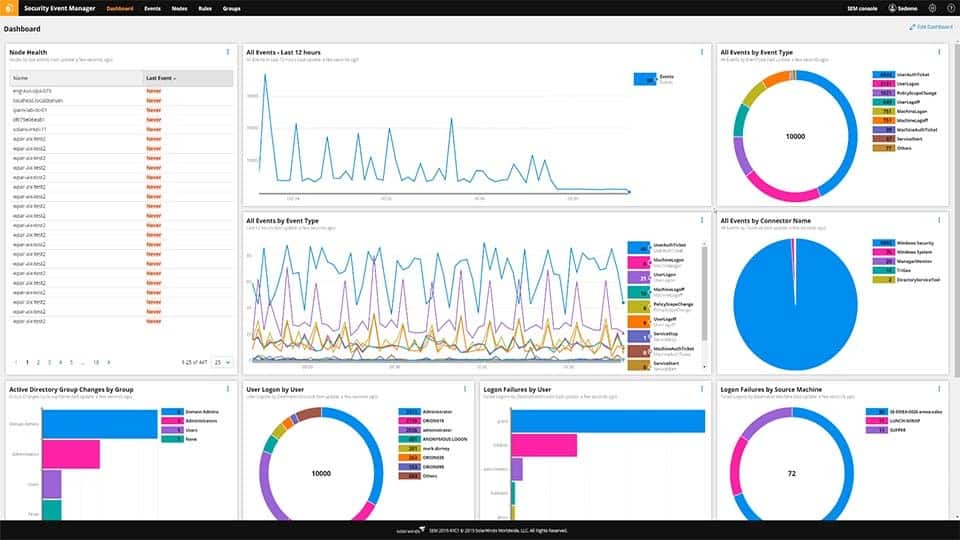
SolarWinds Security Event Manager is a SIEM tool with centralized log collection. The platform collects logs and uses threat intelligence to automatically detects threats and respond. Threat intelligence alerts you when a security event takes place. Route notifications straight to your email so you can follow up.
Key Features:
- Centralized Logging: Streamlines log collection across your network for simplified management.
- Automated Security: Utilizes threat intelligence for real-time threat detection and automated responses.
- Instant Alerts: Sends immediate notifications via email for quick follow-up on security events.
- Visual Insights: Features a dashboard with graphs and charts for easy trend analysis and monitoring.
- Compliance Readiness: Offers pre-configured and customizable compliance reports for major standards.
Why do we recommend it?
SolarWinds Security Event Manager is a log manager and a SIEM. It competes with Splunk in both of these functions although the search and sort features in its log file viewer are not as sophisticated as the analysis features of Splunk. This package consolidated and files logs as well as searching them.
A dashboard view provides a holistic perspective of events throughout your environment. There is a range of visualization options such as graphs and pie charts that allow you to identify performance trends at a glance. For example, you can view Login Failures by Source Machine pie chart to help identify compromised machines.
Compliance reports enable you to audit your environment easily. There are out-of-the-box compliance reports available for regulations such as HIPAA, PCI DSS, SOX, FISMA, GLBA, GPG13, and more. Reports can be customized or generated with built-in templates.
Who is it recommended for?
This is one SIEM option that any business should consider. It is easier to set up than Splunk and you have fewer deployment options – this tool is only available for on-premises installation on Windows Server and there is no cloud version. The service also provides log management.
Pros:
- Comprehensive SIEM Solution: Offers robust log management and threat detection tailored for enterprise needs.
- User-Friendly Interface: Simplifies log analysis without requiring complex query languages.
- Ready-to-Use Templates: Facilitates quick setup with numerous templates for immediate operational capability.
- Deep Historical Analysis: Empowers teams to identify and investigate network anomalies and outliers efficiently.
Cons:
- Learning Curve: Designed for experienced users, necessitating a period of learning to leverage its full capabilities.
SolarWinds Security Event Manager is a SIEM solution that’s ideal for enterprises in need of low maintenance, threat intelligence-driven solution. Prices start at $2,525 (£1,971). Available on Windows, macOS, and Linux. You can download the 30-day free trial here.
8. Sumo Logic
Sumo Logic is a SaaS-based log management tool that you can use to monitor services located on-premises and in the cloud. The platform comes with a range of integrations for services like AWS, Microsoft Azure, Google Cloud, Kubernetes, and Docker, enabling it to fit with your existing tools and services.
Key Features:
- Comprehensive Log Collection: Gathers logs from both on-premises and cloud environments, ensuring no data is overlooked.
- Dynamic Dashboard: Offers customizable dashboards with graphs and charts for a clear data visualization.
- Threat Insights: Provides threat intelligence to quickly identify and act on security threats.
- Immediate Notifications: Ensures real-time alerting for prompt issue detection and resolution.
- Seamless Integrations: Integrates with a wide array of platforms like AWS, Azure, Google Cloud, Kubernetes, and Docker for streamlined operations.
Why do we recommend it?
Sumo Logic is a very similar service to Splunk Cloud. This tool is based around a log manager that collects collates and stores log messages. The platform then provides plants that add on pre-written searches for different purposes, which include performance monitoring and a SIEM for threat detection.
Dashboards, equipped with graphs, charts, and predictive analytics enable you to see a comprehensive view of security events, making it easier to identify and resolve issues when they occur. If you discover a problem, you can use machine learning-driven root cause analysis to identify the origin.
Threat intelligence highlights Indicators of Compromise (IOC) in real-time so you can identify threats to your infrastructure faster. Anomaly detection helps to identify performance anomalies and real-time alerts notify you about threats so that you can take action to resolve them quickly.
Who is it recommended for?
This service is accessibly priced so it will appeal to small businesses as well as large organizations. The charge rate for these services is based on data throughput and so, although there is no Free edition, small companies can get the full service at little cost.
Pros:
- Customizable Visuals: Features highly adaptable dashboards for monitoring that fit specific needs.
- AI-Driven Analysis: Utilizes artificial intelligence to cluster suspicious events, enhancing security analysis.
- Smart Alerting: Employs intelligent algorithms to minimize alert fatigue by reducing redundant notifications.
Cons:
- Learning Investment: Requires a considerable amount of time to master, presenting a steep learning curve.
- Complex Setup: Initial integration and setup process can be intricate, posing challenges for newcomers.
Sumo Logic is one of the most reliable SaaS-based Splunk alternatives that’s easy to deploy. Pricing starts at $3.00 (£2.34) per GB of logs for the Essentials version, which includes log analytics, dashboards, and real-time alerting. You can start the 30-day free trial from this link here.
9. Sematext Logs
Sematext Logs is a log management tool that you can use to collect logs from your infrastructure. Logs are searchable with basic query syntax you can use to identify particular events. With Sematext Logs, you can create custom dashboards to monitor performance trends in real-time.
Key Features:
- Efficient Log Collection: Streamlines the gathering of log data across your infrastructure for comprehensive analysis.
- Customizable Dashboards: Allows for the creation of personalized dashboards to track performance trends in real-time.
- Visual Data Representation: Features graphs and charts for easy interpretation of data and trend analysis.
- Insightful Reports: Generates detailed reports to monitor specific metrics and assess system performance.
- Instant Alerts: Configures real-time alerts to promptly notify via email, Slack, or PagerDuty about significant events.
Why do we recommend it?
Sematext Logs follows the strategy of Sumo logic that log messages are a live source of system activity data and can be mined for performance and security monitoring. This cloud service is actually a hosted implementation of the ELK stack from the Elasticsearch company. Sematext adds on performance data collation searches and cata representation widgets.
When creating a dashboard, you can go to the Reports pane to begin creating reports to collect specific metrics to monitor. Dashboards come with graphs and charts to help you visualize performance and security issues. Real-time alerts automatically notify you by email, Slack, or PagerDuty when certain threshold conditions have been reached.
Who is it recommended for?
The Sematext system is available in four packages. If you just want a log manager that gives you opportunities to analyze data, you would opt for Sematext Logs, which offers a free plan, called the Basic edition. This is limited to processing 500 MB of data per day. Paid plans offer greater capacity.
Pros:
- Flexible Querying: Leverages Elasticsearch for advanced, adaptable query capabilities.
- Broad Data Support: Capable of processing a wide array of data types, including SNMP reports, beyond traditional event logs.
- SLA Monitoring: Offers threshold-based alerts, enabling effective SLA management and monitoring.
- Free Version Available: Provides a Basic edition free of charge for low-volume data processing, ideal for testing and small-scale applications.
Cons:
- Visualization Dependency: Utilizes Kibana for data visualization, which may require additional setup and learning for effective use.
Sematext Logs is one of the top affordable log management solutions on the market that gives you complete control over your monitoring experience. Pricing starts at $50 (£39.03) per month for the Logs package. You can start the 30-day free trial here.
10. LogRhythm NextGen SIEM Platform
LogRhythm NextGen SIEM Plattform is a log analysis tool that comes with the LogRhythm XDR stack. The LogRhythm XDR stack is a mixture of three tools; LogRhythm AnalytiX, LogRhythm DetectX, and LogRhythm RespondX.
Key Features:
- Unified Log Storage: Centralizes log data collection for streamlined access and management.
- Personalized Dashboards: Enables the creation of custom dashboards tailored to specific monitoring needs.
- Flexible Search Options: Offers both structured and unstructured search capabilities for efficient data analysis.
- AI-Powered Analysis: Utilizes an AI engine for advanced threat detection and analysis, equipped with extensive correlation rule sets.
- Automated Alarms: Features alarm systems that notify about potential security incidents promptly.
- SOAR Integration: Integrates with a Security Orchestration, Automation, and Response (SOAR) platform for immediate incident response.
Why do we recommend it?
The LogRhythm NextGen SIEM Platform competes with Splunk Enterprise security. This is a cloud-based system that gathers logs from an enterprise and scans them for Indicators of Compromise (IoCs). The platform records a pattern of standard behavior on the system and focuses on any deviations from that baseline.
AnalytiX centrally stores log data that you can navigate with structured and unstructured searches. Log data can be also viewed through custom dashboards that include visualization options for deeper visibility. An AI engine analyses the logs to identify potential threats. The engine comes with over 900 customizable correlation rule sets out-of-the-box.
DetectX provides security analytics that detects security issues and trigger alarms. The tool automatically recognizes threats with machine learning which identifies problematic patterns and highlights them to the user. The integrated SOAR solution RespondX enables you to automatically perform remediation tasks after the system detects a threat.
Who is it recommended for?
This is a solution for large businesses. As the tool is able to collect log messages from cloud platforms as well as from servers and networks, it is particularly suitable for companies that operate hybrid environments. The package can also provide security scanning for the devices of remote, home-based workers.
Pros:
- User-Friendly Setup: Simplifies log collection and security configurations with easy-to-use wizards, enhancing accessibility for beginners.
- Customizable Interface: Provides a sleek, visually appealing interface that can be extensively customized to meet user preferences.
- Advanced Threat Detection: Employs artificial intelligence and machine learning for comprehensive behavior analysis and anomaly detection.
Cons:
- Lack of Trial Version: Absence of a trial option limits the ability to evaluate the platform before committing.
- Limited Cross-Platform Support: An expansion in support for various platforms would enhance its applicability for diverse IT environments.
LogRhythm NextGen SIEM Platform is a choice worth examining if you’re looking for a solution to automate the log management process. However, you need to contact the company directly for pricing info to request a quote. Available on-premises and in the cloud. Schedule a demo from this link here.
11. Mezmo Log Analysis
Mezmo Log Analysis provides a platform of log collection, consolidation, and analysis functions. With the Mezmo system, you can use exclusion rules to reduce the volume of log data you need to monitor, making it easier to identify the significant security events. Visualization options like charts and graphs allow you to monitor log data trends from a glance.
Key Features:
- Efficient Log Management: Facilitates comprehensive collection, consolidation, and analysis of log data.
- Selective Exclusion: Employs rules to filter out irrelevant log data, focusing on critical security events.
- Visual Trend Monitoring: Utilizes charts and graphs for easy visualization of log data trends.
- Instant Alerts: Configures alerts for immediate notification of system events through various integrations.
- Resource Usage Insights: Offers detailed usage reporting to manage and optimize log data consumption.
- Enhanced Team Collaboration: Includes team controls with role-based access and SSO/SAML authentication for secure data access.
Why do we recommend it?
Mezmo Log Analysis is very similar to the base package of Splunk because you can use its query tool to mine log messages for data and create your own security or performance assessment system. The log manager includes a filtering and query language to parse and selectively forward or consolidate and file messages.
Alerts notify you about system events immediately. The platform integrates with over services such as PagerDuty, Slack, Webhook, and other APIs, so you can receive alerts to wherever you and your team are most active. Usage reporting provides you with an update on your log usage so you can see when you need to manage resource consumption.
Team controls provide you with multiple features you can use to support an entire team. For example, role-based access control enables you to limit access to sensitive data, and SSO/SAML user authentication makes sure that only authorized users can access protected data.
Who is it recommended for?
This package is suitable for businesses that want to develop their own in-house monitoring tool for performance or security analysis. There are few out-of-the-box features because this is more of a framework of tools, just like Splunk. The company also recommends the platform for the development of applications for sale to other businesses.
Pros:
- Intuitive Interface: Boasts a clean, minimalistic design that emphasizes crucial data points for quicker insights.
- Flexible Filtering: Features robust exclusion rules that are straightforward to customize, enhancing log data relevance.
- Extensive Integration Options: Provides a broad API library for seamless connectivity with other platforms and communication tools.
Cons:
- Limited Trial Duration: Offers only a 14-day trial period, which may be insufficient for thorough evaluation.
- Report Customization Complexity: Custom report generation could be streamlined for more user-friendly configuration.
The Mezmo platform also offers a distributed tracing function as a separate service. Both of these services are available from the cloud and are provided on a subscription basis. The Log Analysis module has a Community Edition, which is free to use. This has no data retention option and so you would need to set up immediate forwarding with that option. The cheapest paid edition is called Professional and it offers 25 user accounts. The price starts at $0.80 per GB of data with a three-day retention period. You can get a 14-day free trial of this edition.
Choosing a Splunk Alternative
If you like Splunk but you find it’s missing a feature you could benefit from, there’s no reason why you couldn’t augment its capabilities with another tool.
Out of the Splunk alternatives listed above, Loggly and ManageEngine stand out as some of the top tools. However, we highly recommend researching multiple tools before committing to a purchase to ensure you adopt a solution that closely matches your requirements.
Splunk FAQs
What are the best free alternatives to Splunk?
For a free alternative to Splunk, look at
- Elastic Stack
- LogDNA
- Graylog
- Grafana
- Fluentd
- Loki
Is there an open source version of Splunk?
There isn’t an open source Splunk. However, its major rival, Elastic Stack is open source.

